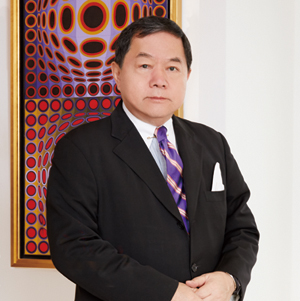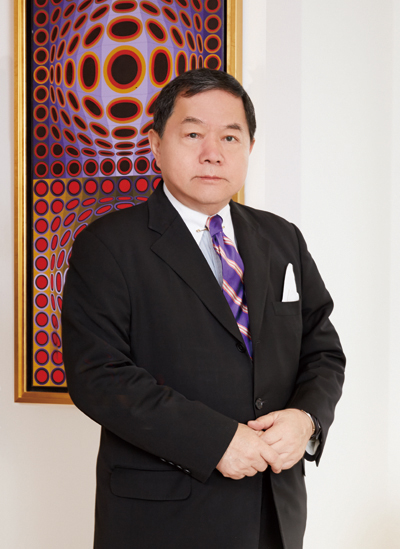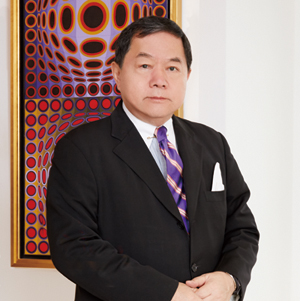2017年11月號 领航者的话
Chairman Douglas Hsu’s Speech on the Far Eastern Memorial Hospital’s 36th Founding Anniversary
Far Eastern Magazine / editorial room


All enterprises must plan strategically, “What is the future? What will be the outlook in the short, medium, and long-term future? This will not only be the responsibilities of the business leaders, but also an important topic for each business segment leader.”
“How to respond to the drastically changing world” has become an universal challenge to the world. That is the impression I perceive after attending several global conferences in 2017, which includes 300 plus retail leaders from the Intercontinental Group of Department Stores (IGDS) General Assembly. In the past, the participants only attended one or two sessions, but this year they stayed throughout the entire forum as everyone is eager to learn the changes in the world, industry trends, coupled with the rise of e-commerce that occupies more than 20% of the retail market, bringing the sense of urgency for retail leaders. Aside from the retail industry, similar situations also occur across different conferences, such as International Textile Manufacturers Federation (ITMF) and the Asia Petrochemical Industry Conference.
The changes across industries will only become more dynamic. Furthermore, the flow of information can be provided in real time nowadays. Each day we learn news across the globe via internet and global media coverage. Through the closely connected IOT (Internet of Things), the interactions have become closely integrated. In response, all industries must enhance their system management and establish their strategic developments to secure their dominance in the future.
Two weeks ago, I had discussion about current retail developments in the U.S. with a department store tycoon. He stated that revenues of physical stores has dropped by nearly 30%, fortunately, his company had expanded into e-commerce and was able to offset the 20% loss in physical stores. Thus, the actual loss was only 8%~9%. In addition, according to his observation, under the impact of gloomy economic sentiment, the overall consumption budget has decreased; however, the spending on food and beverage (F&B) has not been affected. F&B used to account for only 10%~15% of total revenues, now it has increased significantly to 20%~30%. Therefore, he shifted to focus on restaurants. In reality, you have to constantly adapt to changes in consumer behaviors by adjusting F&B or merchandise mix. Also, he noticed that today’s shoppers enjoy more unique style to exhibit individual fashion. So he established a new department to provide personalized services in basic apparels and accessories to customize different colors and arrangements. Shoppers can enjoy a cup of coffee or walk around the mall whilst waiting their customized products. These personalized services may not generate significant revenue, but it offers opportunities for retailer to sell other merchandise during their wait time in order to boost sales. My take away on this is that when our industries are being disrupted by these dynamic changes, can we respond in advance with alternative options?
The Group now operates with 10 public listed companies and 200 plus affiliates. We all know the importance of cutting costs, strengthening training, streamlining structure, elevating technology, and prioritizing customer’s needs; particularly, speed, service and customers are the three vital factors. However, as leaders, we need to plan for the future. Every institute needs to grow continuously, and future growth depends on today’s strategic planning. For instance, the expansion project for Far Eastern Memorial Hospital will be completed in 2018. What will be our next step?
More than 10 years ago, HTC was the stellar performer of Taiwan Stock Exchange. Yet, recently, Google has acquired HTC’s mobile division and a non-exclusive license for HTC’s intellectual property for US$1.1 billion. From this deal, Google gains access to HTC’s research and development team to support its R&D advances in smartphone technologies. This cooperation can ensure the continuous innovation in HTC smartphone technology and Vive in virtual reality business, as their future strategies will focus on the enhanced VR technology to broaden their product value.
In fact, not just smartphones, many industries will march toward the era of VR, hospitals must also expedite the introduction of various emerging technologies and Artificial Intelligence (AI). Among which, the most important is data analytics, especially the Big Data. How can the big data collected from the Group’s various sectors in retail, financial, telecom and medical industries contribute to significant findings and apply them to business operations? For example, Far Eastern Memorial Hospital would need to research data to find out the origins, illness, treatments of its patients? These all rely on data analytics to find useful information for future planning.
Moreover, corporate social responsibilities (CSR) is also a major task for business operators, in particular the green environmental issue. To fulfil the vision of zero nuclear power, Taiwan government has turned to thermal power generation. However, the coal-fired power generation will seriously endanger air quality. Therefore, natural gas power generation has become another preferred option. Currently Taiwan’s natural resources power generation only accounts for less than 5% of Taiwan’s total power generation. Given that many of the Group businesses rely heavily on power supply, and solar energy generation requires extremely ample space, we are trying to explore wind power generation. Hopefully through our joint efforts as a responsible corporate citizen, the Group may advocate the deduction of carbon emission, invest in windmill electricity, and ensure sufficient energy for our future industrial developments.
Of course, to provide proper working conditions is also part of corporate social responsibilities. With the new labor laws providing for “one fixed and one flexible day off per week” coming into effect this year, operating cost has increased. However, we must strike a balance to comply to the regulation as well as provide the employee benefits which reduces the impact to our businesses.
In the end, I would like to thank everyone’s efforts and hope that we may hold on to our vision and objectives, continue to maintain sustainable growth, and benefit more general public.#



















